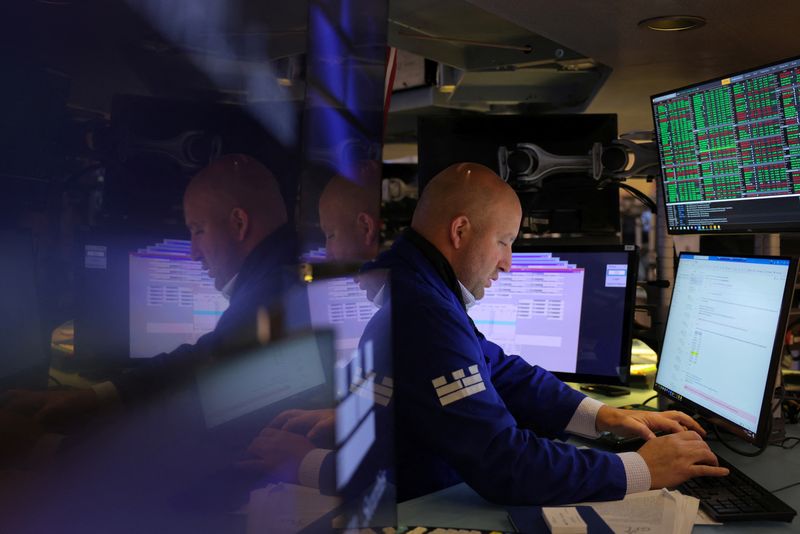By Abigail Summerville
(Reuters) -All three U.S. stock indexes closed lower on Thursday after Microsoft (NASDAQ:MSFT) and Meta (NASDAQ:META) Platforms highlighted growing artificial intelligence costs that could hit their earnings, curbing enthusiasm for megacaps that have fueled the market rally this year.
Shares of Facebook-owner Meta Platforms slipped 4.1% and Microsoft fell 6%, despite both companies beating earnings estimates in results reported after the bell on Wednesday.
Among other so-called Magnificent Seven megacap technology companies, Amazon.com (NASDAQ:AMZN) and Apple (NASDAQ:AAPL) reported quarterly results after the market close. Amazon beat revenue estimates, boosted by strong growth in its cloud services unit. Apple also beat revenue and profit expectations as iPhone sales grew.
Shares of Alphabet (NASDAQ:GOOGL), which reported on Tuesday, fell 1.9%.
"You had three of the Magnificent Seven all say they basically have open-ended budgets for AI spend and investors don't like to hear that," said Carol Schleif, chief investment officer at BMO (TSX:BMO) Family Office.
"The intermediate and longer-term implications of this buildout are really important for U.S. long-term growth and long-term productivity. ... In the short run, investors are asking where's the profit from it?"
Microsoft and Meta both said capital expenses were growing due to AI investments, which could reduce profitability.
The Dow Jones Industrial Average fell 378.08 points, or 0.90%, to 41,763.46. The S&P 500 lost 108.22 points, or 1.86%, at 5,705.45 and the Nasdaq Composite dropped 512.78 points, or 2.76%, to 18,095.15.
The Personal Consumption Expenditures price index, the Federal Reserve's preferred inflation metric, rose 0.2% in September, in line with economists' expectations. However, the core figure was 2.7% year-over-year, slightly above the 2.6% forecast, while consumer spending increased a little more than expected.
After the data, traders stuck to bets for a 25-basis-point rate reduction in the Fed's Nov. 6-7 meeting.
"We do expect them to cut by a quarter next week because there is nothing in the data this week that should throw them off of that," Schleif said.
Information technology led declines among sectors, but upbeat results from ConocoPhillips (NYSE:COP) and Entergy (NYSE:ETR) lifted energy and utilities.
An index of chip stocks fell 4%, led by a 17.4% plunge in Monolithic Power Systems (NASDAQ:MPWR) shares after the maker of power control products and semiconductors used in vehicles reported its results. Nvidia (NASDAQ:NVDA) also dropped 4.7%.
The VIX, Wall Street's "fear gauge," ticked up as investors braced for more volatility in the next few weeks from corporate results and the Nov. 5 U.S. presidential election followed by the Fed's policy-setting meeting.
Estee Lauder (NYSE:EL) posted its worst day on record, dropping 20.9% after the cosmetics company withdrew its 2025 annual forecasts.
Shares of Uber Technologies (NYSE:UBER) fell 9.3% after the ride-hailing company forecast fourth-quarter gross bookings below expectations.
Intel (NASDAQ:INTC) reported earnings after the close that were weighed down by impairment and restructuring charges.

Declining issues outnumbered advancers by a 2.66-to-1 ratio on the NYSE. There were 106 new highs and 97 new lows on the NYSE.
The S&P 500 posted 24 new 52-week highs and nine new lows, while the Nasdaq Composite recorded 59 new highs and 159 new lows.